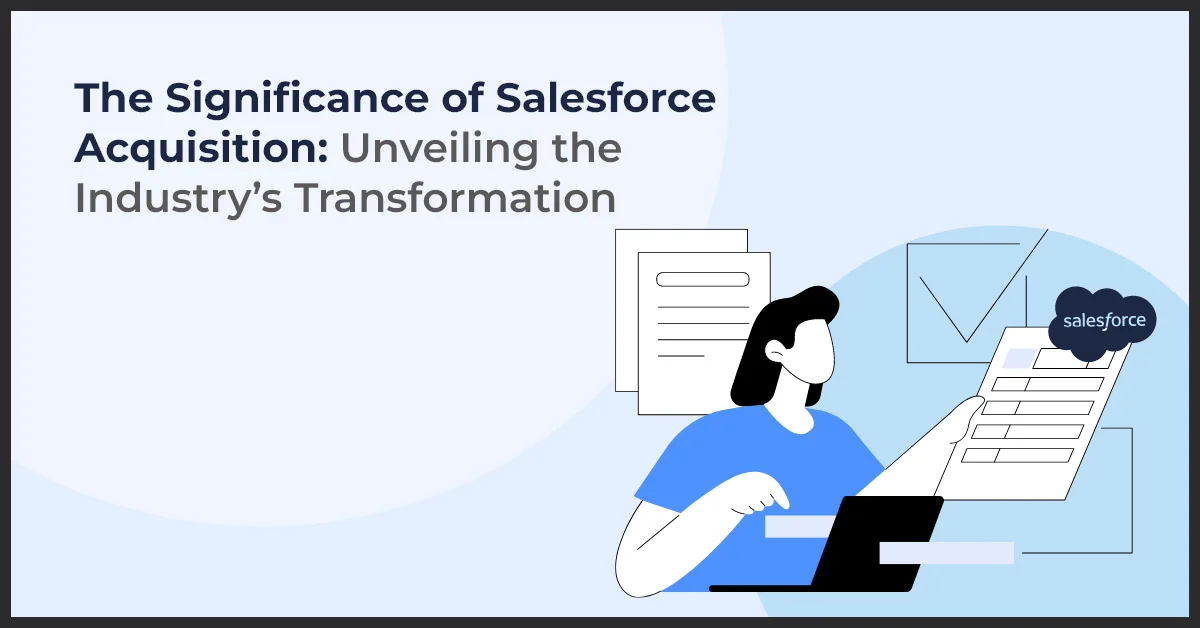The Significance of Salesforce Acquisition: Unveiling the Industry’s Transformation

Published on: November 3, 2023
Updated on: May 27, 2024
536 Views
- Salesforce
8 min read
When it comes to the world of enterprise software and customer relationship management (CRM), there's no denying the immense influence of Salesforce. With its cutting-edge technology and unrivaled market presence, Salesforce continually shapes and revolutionizes the industry. However, one particular event that sparks discussions and reverberates throughout the business world is the Salesforce acquisition.
Mergers and acquisitions have long been a common occurrence in the corporate landscape. Yet, it is the Salesforce acquisition that often becomes the catalyst for dialogues and speculations about wider industry transformations. The company's strategic moves and partnerships with Salesforce not only impact itself but also have broader implications for the CRM and cloud computing sector as a whole.
The curiosity surrounding the reasons behind the Salesforce acquisition often drives industry insiders and enthusiasts to delve deeper into the motives and potential implications. From reshaping the competitive landscape to expanding product offerings, this landmark event leaves no stone unturned in the quest to unlock its true significance.
Companies Involved in the Acquisition
When discussing the Salesforce acquisition, it is crucial to understand the companies involved and their significance. The primary company being acquired is Salesforce, a global leader in customer relationship management (CRM) software.
Salesforce:
Salesforce, founded in 1999, has revolutionized the CRM industry with its cloud-based platform. The company offers a wide range of CRM solutions, including sales automation, marketing, and customer service tools. With a strong reputation for innovation and cutting-edge technology, Salesforce has built a loyal customer base and achieved substantial growth.
Known for its "No Software" motto, Salesforce has transformed the way businesses manage their customer relationships. Its user-friendly interface, scalability, and flexibility have made it the go-to choice for companies of all sizes, from startups to Fortune 500 enterprises.
Since its establishment, Salesforce has consistently expanded its product portfolio and acquired several companies to strengthen its market position. With a proven track record of successful acquisitions, Salesforce has shown its ability to integrate new technologies seamlessly.
Other Key Players and Stakeholders:
In addition to Salesforce, there are other important players and stakeholders involved in the acquisition:
- Acquisition Target Company: The acquisition target company, whose name has not been disclosed, is a prominent player in the CRM software market. It has a strong product lineup, loyal customer base, and considerable market share. This acquisition is seen as a strategic move by Salesforce to further expand its reach and enhance its offerings.
- Investors: Various investors, including venture capital firms and individual shareholders, have invested in both Salesforce and the acquisition target company. The success of the acquisition will be of significant interest to these stakeholders, as it will directly impact their investments.
- Competitors: Competing CRM software providers closely monitor acquisitions in the industry. This acquisition will undoubtedly affect the competitive landscape, potentially prompting other companies to make strategic moves to remain competitive.
- Customers: Existing customers of both Salesforce and the acquisition target company will be curious to see how the acquisition will impact their experience and the future direction of the products they rely on.
Considering the collective influence of these players and stakeholders, this Salesforce acquisition holds significant importance in the CRM software industry. It has the potential to reshape the competitive landscape and drive innovation in customer relationship management.
Financial Analysis of the Acquisition
When it comes to discussing the financial aspects of the Salesforce acquisition, there are key factors to consider. One of which is the deal size, which refers to the overall value of the acquisition. In this case, the deal size of the Salesforce acquisition is significant, indicative of the strategic importance and potential synergy between the two companies.
Another critical financial detail is the price paid to acquire the company. This figure represents the monetary value that Salesforce invested in acquiring the target company. By examining this price, we can gauge the perceived value and growth potential attributed to the acquired company.
Furthermore, a thorough financial analysis should delve into related financial details such as revenue, profits, or losses. These components provide valuable insights into the valuation of the acquired company and its financial implications. Understanding the financial performance of both Salesforce and the acquired company enables us to assess the potential impact on their financial standings.
The Salesforce acquisition holds the potential to impact the financial performance of both companies. Through this analysis, we aim to provide insights into how this acquisition may influence their revenue streams, profitability, market position, and overall financial growth.
Impact on Customers and Users
When considering the impact of the Salesforce acquisition on existing customers and users, several factors need to be taken into account.
Changes to Product or Service Offerings
With the acquisition, there may be changes to the current product or service offerings provided by Salesforce. This could include the integration of new technologies, the addition of new features, or even the discontinuation of certain products or services. As a result, existing customers and users may need to adapt to these changes and familiarize themselves with any new offerings.
Effect on Customer Support and Contracts
The acquisition might also have implications for customer support and contracts. It is possible that there could be changes to customer support systems or processes, as well as updates to contract terms and conditions. Customers and users should be prepared for potential adjustments in how they receive support and the terms under which they access Salesforce's products or services.
Potential Disruptions or Improvements
While any major acquisition can lead to disruptions, it is also likely to bring about improvements for customers and users. The acquisition may result in enhanced product functionality, improved integration capabilities, or even the introduction of new services. However, it is important to note that in the short term, there may be some temporary disruptions as the companies align their operations and systems.
In summary, the Salesforce acquisition can potentially bring both positive and negative impacts to existing customers and users. It is crucial for customers to stay informed about any changes to product offerings, customer support, and contractual terms. The acquisition could also bring exciting opportunities for improvements to the overall experience for customers and users of Salesforce's products and services.
Market Analysis and Competition
As Salesforce completes its acquisition, it is important to analyze how this significant move impacts the industry as a whole. The market analysis provides valuable insights into the changes and opportunities that arise from this acquisition.
Impact on the Industry
The acquisition is expected to have a profound impact on the industry due to Salesforce's strong market position and influence. The company's acquisition allows for a wider product portfolio, expanded customer base, and increased market share. This enables Salesforce to further solidify its dominance in the industry, creating potential challenges and opportunities for competitors.
The expanded product portfolio resulting from the acquisition enables Salesforce to offer a comprehensive solution to its customers. This can positively impact the industry by providing customers with a one-stop-shop for their business needs, reducing the reliance on multiple vendors.
Competitive Landscape
The acquisition strengthens Salesforce's position in the competitive landscape, positioning the company against its competitors. By integrating the acquired assets and technologies, Salesforce can enhance its competitiveness and differentiate itself from its rivals.
Competitors in the industry need to adapt to the new dynamics created by this acquisition. The competitive landscape is likely to experience increased rivalry as competitors strive to maintain market share and customer loyalty in the face of Salesforce's enhanced capabilities.
Regulatory and Antitrust Considerations
When evaluating the market impact of the acquisition, it is essential to consider potential regulatory and antitrust considerations. Mergers and acquisitions of this scale often undergo scrutiny by regulatory bodies to ensure fair competition and protect consumer interests.
Regulatory or antitrust concerns may arise if the acquisition results in a significant market concentration, limiting competition and potentially negatively impacting consumers. It is important to closely monitor any regulatory developments and potential adjustments in the competitive landscape as a result of these considerations.
Integration and Post-Acquisition Plans
After the Salesforce Acquisition, the company has developed a comprehensive plan to seamlessly integrate the acquired company into its existing operations. This integration process aims to maximize efficiency and capitalize on synergies between the two entities.
One key aspect of the integration plan is the evaluation of the management team and organizational structure. Salesforce recognizes the importance of aligning leadership and ensuring smooth transition during the post-acquisition phase. As such, there may be potential changes in the management team or organizational structure to optimize performance and fully leverage the capabilities of both companies.
The combined entity's overall roadmap involves strategically combining resources, technology, and expertise to create a unified force in the market. Salesforce aims to maximize synergy by leveraging the strengths of both companies and their respective product offerings.
Furthermore, the strategic plans for maximizing synergy go beyond the immediate post-acquisition phase. Salesforce envisions a long-term integration plan that focuses on streamlining processes, enhancing customer experiences, and innovating new solutions. This integrated approach will enable the combined entity to deliver even greater value to customers and stay ahead of competition.



